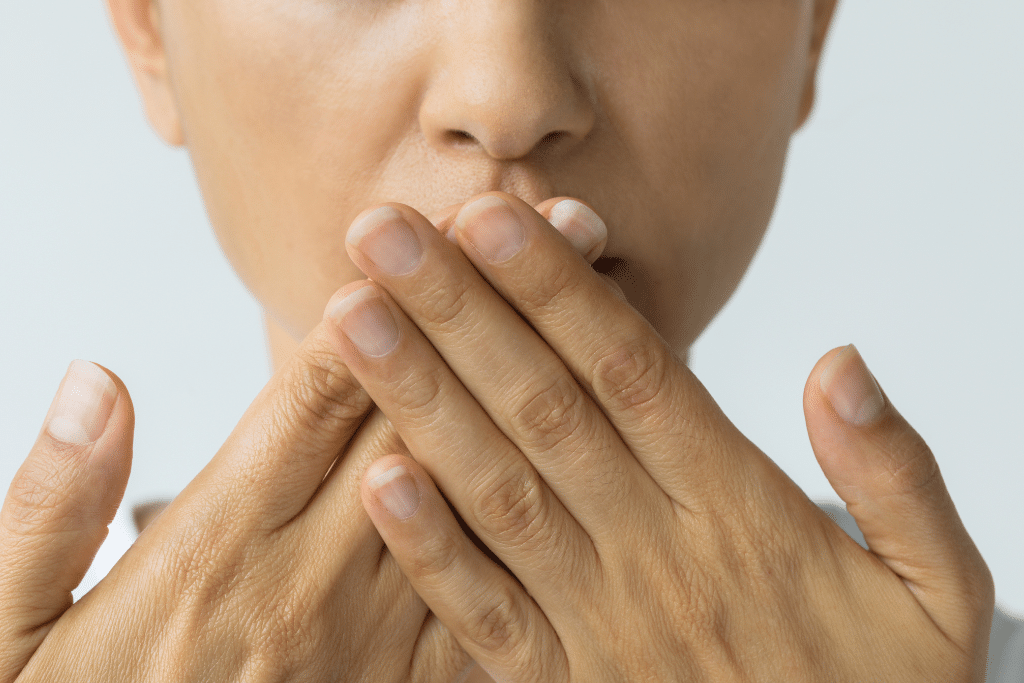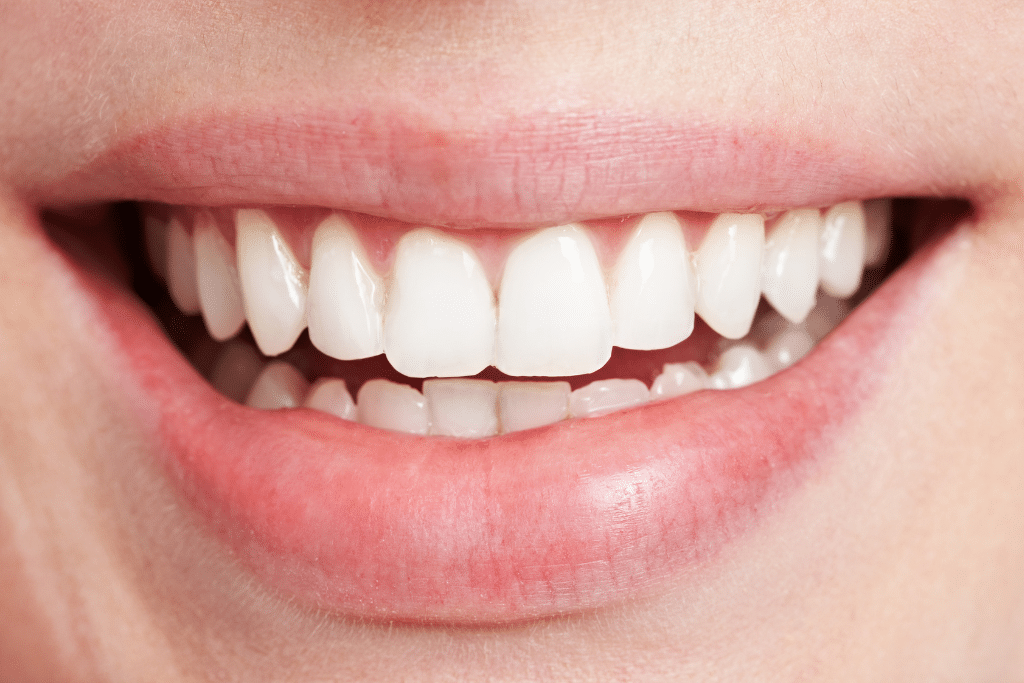What causes Bad Breath? Understanding Halitosis


Halitosis, commonly known as bad breath, is an unpleasant odour emanating from the mouth. It can be a temporary issue or a chronic condition like gum disease. Knowing what causes bad breath and how to fix it is key to oral health. There are many reasons for mouth odour; we’ll look at all of them and how to beat bad breath.
What are the Causes of Bad Breath?
Not Flossing or Brushing your teeth.
Bad breath is caused by not brushing and flossing. Food stays in your mouth, and bacteria grow. Bacteria form a sticky film called plaque, which means tooth decay and gum disease. Using a tongue scraper removes bacteria from the tongue; a coated tongue is another source of mouth odour.
Gum Disease
Gum disease (gingivitis and periodontal disease) is a major cause of bad breath. Bacteria breed in deep pockets between the teeth and gums. Visit the dentist regularly to detect and treat gum disease early.
Dry Mouth
Dry mouth (xerostomia) is when insufficient saliva moistens the mouth. Saliva neutralises acid from bacteria and washes away dead cells on the tongue, gums and cheeks. Conditions like chronic sinusitis, gastroesophageal reflux disease (GERD) and certain medications can reduce saliva and cause dry mouth and bad breath. Use artificial saliva products and drink water.
Eating certain foods
Garlic, onions and sugary drinks are also causes of bad breath. They’re broken down in the body, enter the bloodstream and end up in the lungs and out of the mouth. Chewing sugar-free gum or mints will mask temporary mouth odour and stimulate saliva.
What does halitosis smell like?
Halitosis (bad breath) smells different depending on the reason. Here are some how-to-describe-it descriptions:
- Foul or Rotten: This is the most common type of bad breath caused by not brushing and flossing. Food stays in the mouth and decomposes, and bacteria that feed on that food produce sulfur compounds that smell like rotten eggs.
- Fruity or Sweet: Sometimes fruity or sweet means uncontrolled diabetes. When the body can’t use sugar, it breaks down fat and produces ketones. High ketones make the breath smell fruity.
- Ammonia or Urine-Like: This smell means kidney problems. When kidneys can’t filter waste from the blood, it smells like ammonia in the breath.
- Acidic or Sour: GERD (gastroesophageal reflux disease) occurs when stomach acid flows back into the oesophagus, causing a sour or acidic smell in the breath.
- Musty or Moldy: Chronic sinus infections or postnasal drip mean mucus, and that mucus harbours bacteria that smell bad.
- Metallic: Metallic taste or smell can be from medications, oral infections or bleeding gums.
- Faecal: In severe cases, breath that smells like poop means a bowel obstruction or severe gastrointestinal problems.
All these smells mean something. If you have bad breath with any of these smells, see a healthcare provider or dentist to find out why and how to fix it.
How do I stop my breath from smelling?
Good Oral Hygiene
Good oral hygiene prevents and cures bad breath. Brush twice a day with fluoride toothpaste and a soft toothbrush. Brush and floss daily and use tongue scrapers and antibacterial mouthwash.
Eat healthy—fruits and veggies keep mouths moist and produce saliva. Avoid sugary foods and drinks to prevent decay and bad breath.
Underlying Health Issues
Sometimes, bad breath is a sign of something underlying. Chronic sinus infections, postnasal drip, tonsil stones, and GERD (gastroesophageal reflux disease) are reasons for bad breath. Even with good oral hygiene, see a primary care provider or dentist if you have bad breath.
Tobacco products like cigarettes and chewing tobacco are other reasons for bad breath. Tobacco use can lead to gum disease, dry mouth, and other health problems that cause bad breath. Quitting tobacco helps with oral health and mouth odour.
Regular Dental Visits
Regular visits to your dentist are key to good oral health and bad breath prevention. At Fulham Road Dental, we want you to smile.
If you have bad breath (halitosis), here’s what you need to know:
General Dentist: Your first visit should be with one of our general dentists. They will examine your teeth, gums, and mouth to see if cavities, gum disease, or poor oral hygiene habits cause bad breath. Our general dentists can clean and advise.
Periodontist: If gum disease (periodontal disease) is causing your bad breath, our general dentist will refer you to our periodontist. Periodontists at Fulham Road Dental prevent, diagnose, and treat gum disease and other tooth-supporting structures.
In addition to these services, Fulham Road Dental offers cleanings, fluoride treatments, and products to keep your mouth healthy and clean. We care for all of your dental needs.
Book with Fulham Road Dental today and start smiling and breathing fresher.
How to get rid of bad smell after tooth extraction?
Experiencing a bad smell after a tooth extraction is not uncommon and can usually be managed with proper care. Here are some effective steps to get rid of the bad smell:
1. Maintain Good Oral Hygiene
- Gently Brush and Floss: Carefully brush your teeth and floss around the extraction site, avoiding direct contact with the wound for the first few days. Use a soft-bristled toothbrush and fluoride toothpaste.
- Rinse with Salt Water: Rinse your mouth gently with a warm salt solution several times daily, especially after meals. This helps keep the area clean and reduces bacteria.
- Avoid Alcohol-Based Mouthwash: These can be too harsh on the healing area and may irritate.
2. Stay Hydrated
- Drink Plenty of Water: Staying hydrated helps keep your mouth moist and can prevent bacteria buildup that causes bad smells.
- Avoid Alcohol and Caffeine: These can dry out your mouth, worsening the smell.
3. Follow Your Dentist’s Instructions
- Medications: Take any prescribed antibiotics to prevent infection and use pain relievers as directed to manage discomfort.
- Follow-Up Visits: Attend any scheduled follow-up appointments to ensure proper healing.
4. Avoid Certain Foods and Habits
- Steer Clear of Tobacco Products: Smoking or using other tobacco products can delay healing and contribute to bad breath.
- Avoid Sugary and Sticky Foods: These can get trapped in the extraction site and promote bacterial growth.
- Limit Hard and Crunchy Foods: These can irritate the extraction site and may dislodge any blood clot forming.
5. Monitor for Complications
- Signs of Infection: If you notice increased pain, swelling, redness, or pus, contact your dentist immediately.
- Dry Socket: If you experience severe pain and a bad smell several days after extraction, you may have a dry socket, which requires professional treatment.
6. Practice Gentle Care
- Avoid Sucking or Spitting Vigorously: This can dislodge the blood clot and lead to a dry socket.
- No Straws: Avoid using straws for drinking, as the suction can disturb the healing site.
Fight Bad Breath with Good Oral Care
Bad breath (halitosis) is caused by many things: poor oral hygiene, gum disease, dry mouth (not enough saliva), and food particles. Good oral hygiene (brush, floss, scraper), eating healthy foods, water, and no tobacco. If bad breath persists, see a dental care professional who can help give advice and clinically treat bad breath.

